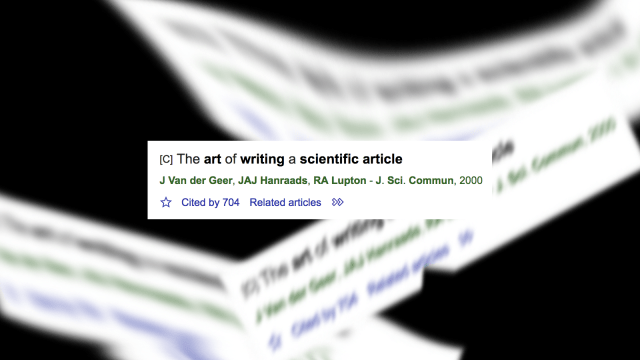Image: Ryan F. Mandelbaum/Screenshot
Did you actually read all the works you cited in your high school and uni papers? If not, you’re probably not the only one. Because a non-existent paper seems to have been cited over four hundred times by supposedly reputable research.
Leiden University professor Pieter Kroonenberg found the “phantom reference” in a nonexistent journal while hunting for an article on writing scientific articles, according to a post on the blog Retraction Watch. Middlesex University professor Anne-Wil Harzing dug into the issue and found that the article was a made-up citation from the science publisher Elsevier to show authors how to cite works. It’s as if I pasted Lorem ipsum text into this article instead of a quote. Here’s the reference:
Van der Geer, J., Hanraads, J.A.J., Lupton, R.A., 2010. The art of writing a scientific article. J Sci. Commun. 163 (2) 51-59.
Most of the papers that cited the phantom reference were “fairly low-quality conference papers,” Harzing told Retraction Watch. But still, the four hundred all appeared on the reputable Web of Science that indexes scientific articles. The reference pops up over seven hundred times on a Google Scholar Search.
This probably isn’t a case of fraud. “We found it hilarious,” Retraction Watch’s cofounder, journalist, and past professor of mine Ivan Oransky told Gizmodo. The researchers told Retraction Watch that the reference was a mistake, “[but] it makes us sit up, take notice, and wonder how it happens. I would ascribe laziness and failure of quality control.”
Given the “publish-or-perish” attitude of science, there’s lots of places where lower quality work slips through, as well as journals preying on scientists who’ll pay to publish or don’t know any better. The presence of even more junk on the less-filtered Google Scholar results demonstrates that, well, there’s a lot of crap out there.
But in this case, since no one is outwardly committing fraud, Oransky hopes that this silly story will help continue the conversation about improving scientific publishing.
“If this is a story that makes it more comfortable for people to try and tackle [these issues] as opposed to out and out fraud, then I’m happy.”
